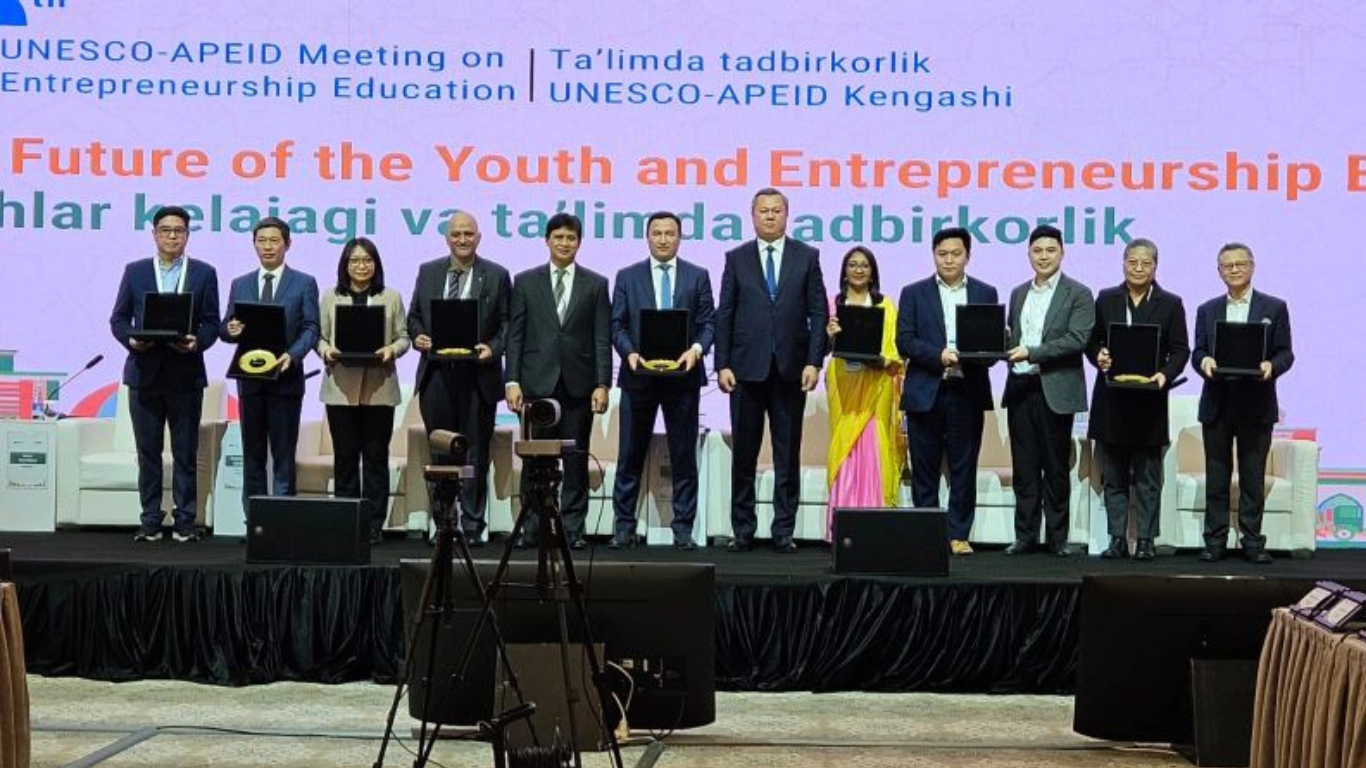
The 10th UNESCO-APEID Meeting on Entrepreneurship Education brought together 200 representatives from 35 countries—educators, policymakers, practitioners, and key stakeholders in the field of entrepreneurship—at the International Hotel Tashkent, Uzbekistan, from October 10–11, 2024. This event was meticulously organized by UNESCO, the Uzbekistan government, and Alfraganus University, making it a standout occasion.
Mr. Raza Abbas, the Focal Person for the UNESCO Entrepreneurship Education Network (Pakistan Chapter) and Head of Incubation at the Shahjehan Syed Karim Incubation Center (SSKIC), Institute of Business Management (IoBM), Karachi, Pakistan, represented the Pakistan National Chapter. He showcased the chapter's activities and highlighted Inclusive Entrepreneurship Education initiatives at the meeting held at Alfraganus University, Tashkent.
The event, which ran from October 10–13, 2024, included Mr. Abbas' presentation on Pakistan’s inclusive initiatives, such as Start-Up Readiness programs and future plans being rolled out at SSKIC, IoBM. He emphasized the private sector's role as a key driver of sustainable entrepreneurship education, both nationally and regionally. Mr. Abbas highlighted the importance of collaborative leadership and partnerships with other National Chapters to enhance impact. Additionally, he stressed the inclusion of women, marginalized communities, and school educators as critical components of sustainable entrepreneurship education. He further noted that regular dialogues among National Chapter representatives are essential for driving collaboration and achieving sustainable outcomes.
Two start-ups founders from ShahJehan Syed Karim Incubation Center- SSKIC-Cohort 3 at the Institute of Business Management were also selected to present their start-ups respectively -Ms. Shahma Aroob- Founder Filtresha and Mr. Kunwar Shahroz Ali Khan- Founder- Zarai Baramdaat at the meeting virtually.
Preamble
Reflecting on the history of the UNESCO Entrepreneurship Education Network (EE-Net), which was established in December 2013, the network serves as a vital Asia-Pacific platform dedicated to enhancing entrepreneurship education through knowledge exchange, multi-stakeholder collaboration, and the development of innovative tools and approaches. The EE-Net continues to be crucial in addressing the ever-evolving challenges young people face in today’s increasingly complex job markets. We honor the memory of the late Dr. Gwang-Jo Kim, former Director of UNESCO Bangkok, whose visionary efforts in promoting entrepreneurship education continue to guide us. This 10th meeting aligns with Uzbekistan’s national priorities for 2024, as President Shavkat Mirziyoyev has declared it the "Year to Support Youth and Entrepreneurship," showcasing the nation’s commitment to empowering its younger generations.
Key Highlights
Mr. Raza Abbas, the focal person of the Pakistan National Chapter, received a shield on behalf of the Institute of Business Management (IoBM) as the appointed National Chapter of the UNESCO Entrepreneurship Education Network in Pakistan.
Presentation Themes
This meeting has reaffirmed the pivotal role of entrepreneurship education in equipping young people to navigate the complex challenges of the 21st century, particularly within the framework of Industry 4.0 and the rapid technological advancements reshaping global industries. Participants emphasized the need for a comprehensive and inclusive approach to entrepreneurship education—one that fosters innovation, resilience, and adaptability in young entrepreneurs.
A collective aspiration emerged for the EE-Net to address urgent global concerns, with a strong focus on green, digital, and sustainable economies. Entrepreneurship education should drive solutions that tackle social, environmental, and technological issues, facilitating the transition to greener economies in an increasingly digital world. Key areas for future action include:
· Strengthening collaboration between governments, educational institutions, and the private sector to design and implement more effective entrepreneurship education programs.
· Promoting entrepreneurship education that integrates digital skills, sustainability, social value creation, and addresses global socio-economic, environmental, and technological challenges.
· Expanding access and inclusivity in entrepreneurship education, ensuring that marginalized and disadvantaged groups, particularly in rural and urban areas, are empowered with the skills needed for the future.
Call to Action
The UNESCO Entrepreneurship Education Network (EE-Net) renews its commitment to addressing the needs of young people, preparing them to become tomorrow's leaders, innovators, and agents of change. We pledge to support the creation of sustainable entrepreneurship ecosystems within our respective countries and work collaboratively to achieve the United Nations Sustainable Development Goals (SDGs).
Moreover, EE-Net will actively contribute entrepreneurial solutions to global social, economic, environmental, and technological challenges, fostering innovation in green technologies and promoting environmentally sustainable business models. Let this meeting be the beginning of a new chapter in global entrepreneurship education—one that empowers youth, drives innovation, promotes inclusive and sustainable economic growth, and confronts the critical challenge of climate change in the digital era.
IoBM’s participation in the 10th UNESCO-APEID Meeting on Entrepreneurship Education in Uzbekistan directly advances several United Nations Sustainable Development Goals by promoting inclusive and sustainable entrepreneurship education. The focus on skills, critical thinking, and innovative practices for youth and marginalized groups contributes to SDG 4 – Quality Education, while youth-led start-ups and entrepreneurial ecosystems advance SDG 8 – Decent Work and Economic Growth. By emphasizing digital transformation, Industry 4.0, and green technologies, the initiative supports SDG 9 – Industry, Innovation, and Infrastructure, while its commitment to integrating women and marginalized communities aligns with SDG 10 – Reduced Inequalities. Finally, the collaborative framework between governments, academia, and the private sector reflects SDG 17 – Partnerships for the Goals, underscoring the importance of cross-sectoral cooperation. Together, these efforts highlight IoBM’s role in fostering inclusive growth, innovation, and sustainable development on both national and global levels.